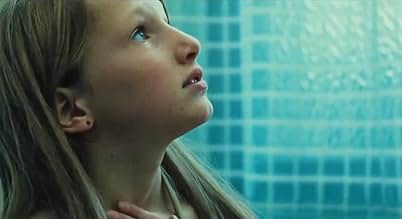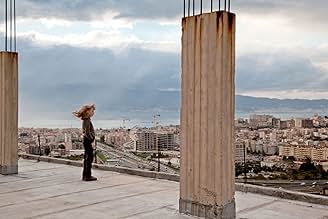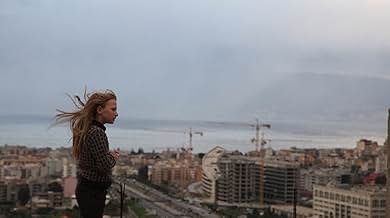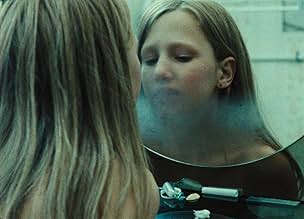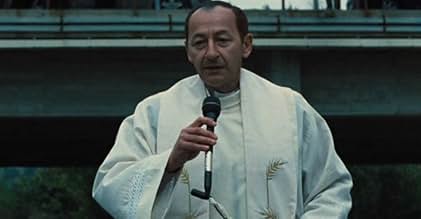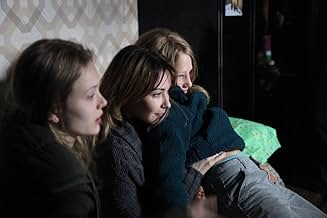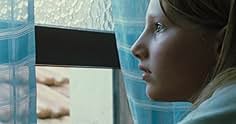IMDb-BEWERTUNG
6,8/10
2320
IHRE BEWERTUNG
Füge eine Handlung in deiner Sprache hinzuThirteen year-old Marta has recently moved back to southern Italy with her mother and older sister and struggles to find her place, restlessly testing the boundaries of an unfamiliar city an... Alles lesenThirteen year-old Marta has recently moved back to southern Italy with her mother and older sister and struggles to find her place, restlessly testing the boundaries of an unfamiliar city and the catechism of the Catholic church.Thirteen year-old Marta has recently moved back to southern Italy with her mother and older sister and struggles to find her place, restlessly testing the boundaries of an unfamiliar city and the catechism of the Catholic church.
- Regie
- Drehbuch
- Hauptbesetzung
- Auszeichnungen
- 10 Gewinne & 10 Nominierungen insgesamt
Yile Yara Vianello
- Marta Ventura
- (as Yle Vianello)
Giovanni Federico
- Nino
- (as Gianni Federico)
Monia Alfieri
- Donatella
- (as Monica Alfieri)
Empfohlene Bewertungen
Alice Rohrwacher cannot disappoint.
If like myself, you have seen her latter films (and don't skip the documentary La Futura) - and are wonder-ing about seeing this film, rest assured even in her debut, you shall be rewarded.
This film is a little slower or more subtle perhaps than the others. Rohrwacher has not yet put her full faith in nature, but there are gusts of winds that sort of blow the (what else) young teenage female heroine through the town she has recently moved to.
In contrast to the church's literal formula, young Marta goes on her own pilgrimage. She is a misfit both in catechism and her sister's borrowed clothing. The viewer may have to be gentle with her and this film , but ultimately there is a lot going on. Trust in her, as in all of Rohrwacher's adolescent savants. The wisdom of the naif.
I feel like this could pair well with the more grandiose "The Mission." The film is not so much about religion, though it can feel that way. To me the tale is more about abandonment.
Amazing how the director connects a famous phrase from the Bible, Christ's cry - in Greek as part of the aforementioned formula, to the town of Roghudi Vecchio. There is also the subplot of Santa (the real spirit of the small church) and Don Mario (definitely the corporate/corporeal side) - and Santa fearing his abandoning.
There are religious tropes that tantalize through-out, walking on water, loaves and fishes, the blood of innocents - but do not be led into the temptation of trope tagging, instead enjoy the beauty of doubt, and the wrestling with abandonment.
Well that, and Rohrwacher's portrayal of adolescence as somehow more knowing and more flexibly real than rigid structures of catechism and capitalism and the other isms Rohrwacher so strongly distrusts.
If like myself, you have seen her latter films (and don't skip the documentary La Futura) - and are wonder-ing about seeing this film, rest assured even in her debut, you shall be rewarded.
This film is a little slower or more subtle perhaps than the others. Rohrwacher has not yet put her full faith in nature, but there are gusts of winds that sort of blow the (what else) young teenage female heroine through the town she has recently moved to.
In contrast to the church's literal formula, young Marta goes on her own pilgrimage. She is a misfit both in catechism and her sister's borrowed clothing. The viewer may have to be gentle with her and this film , but ultimately there is a lot going on. Trust in her, as in all of Rohrwacher's adolescent savants. The wisdom of the naif.
I feel like this could pair well with the more grandiose "The Mission." The film is not so much about religion, though it can feel that way. To me the tale is more about abandonment.
Amazing how the director connects a famous phrase from the Bible, Christ's cry - in Greek as part of the aforementioned formula, to the town of Roghudi Vecchio. There is also the subplot of Santa (the real spirit of the small church) and Don Mario (definitely the corporate/corporeal side) - and Santa fearing his abandoning.
There are religious tropes that tantalize through-out, walking on water, loaves and fishes, the blood of innocents - but do not be led into the temptation of trope tagging, instead enjoy the beauty of doubt, and the wrestling with abandonment.
Well that, and Rohrwacher's portrayal of adolescence as somehow more knowing and more flexibly real than rigid structures of catechism and capitalism and the other isms Rohrwacher so strongly distrusts.
While harshly critical of the deadening effects of religious dogmatism director Alice Rohrwacher is never crudely so. She manages to inject some level of sympathy for the abusive catechism teacher as well as the careerist priest while having the most negative person be the very secular, cruelly teasing older sister of the main character. I also like how the film's dramatics never veer into histrionics. In other words, Rohrwacher has a steady, controlling hand, for me a sure sign of a good film maker. Another indication is her ability to coax an amazingly fine performance from a child actor as she does here with Yie Vianello as the traumatized yet rebellious 13 year old Marta. I hope to see more of this fine director's work as well as Vianello's subsequent film, "Sow The Wind". Give it an A minus. (Why not an A? Well, for one, I would have liked more of an examination of why Marta's dad ignores her and prefers the horrendous older sister. And for another I wanted to know why Marta's family had to move from Switzerland to Calabria which, on the trauma scale, is like going from Boulder Colorado to Greenville Mississippi.)
As anyone who has seen "The Wonders" or "Happy as Lazzaro" will know Alice Rohrwacher is one of the marvels of contemporary cinema. "Corpo Celeste" is her lesser-known, but no less astonishing, debut made with an almost documentary realism as we get to know the world through the eyes of 13 year old Marta as she comes to terms with growing up. Unlike other girls her age, however, Marta is subjected to perhaps a little more religious education than is usual as she prepares for her confirmation. This is Catholic Italy, after all.
Like Lazzaro, Marta is possessed of an innocence that is almost other-worldly. She might like to wear her big sister's bra but she's also remarkably childlike; Rohrwacher does innocence like no-one else. She also imbues her film with a nice sense of humour, even bordering on the cynical, (the priest whose ringtone on his mobile is 'The Minute Waltz' is both ambitious and something of a prig and is magnificently played by the late Salvatore Cantalupo). Indeed, Rohrwacher draws wonderfully naturalistic performances from her entire cast and in particular from Yie Vianello as Marta. In fact, "Corpo Celeste" isn't just a superb debut but one of the best films about both childhood and religion I've ever seen. With only three features to her name, Rohrwacher may just be my favourite director right now.
Like Lazzaro, Marta is possessed of an innocence that is almost other-worldly. She might like to wear her big sister's bra but she's also remarkably childlike; Rohrwacher does innocence like no-one else. She also imbues her film with a nice sense of humour, even bordering on the cynical, (the priest whose ringtone on his mobile is 'The Minute Waltz' is both ambitious and something of a prig and is magnificently played by the late Salvatore Cantalupo). Indeed, Rohrwacher draws wonderfully naturalistic performances from her entire cast and in particular from Yie Vianello as Marta. In fact, "Corpo Celeste" isn't just a superb debut but one of the best films about both childhood and religion I've ever seen. With only three features to her name, Rohrwacher may just be my favourite director right now.
Marta(Yil Vianello) is a twelve-year-old girl preparing for her Confirmation at a church in Calabria. The waif-like kid has some serious questions about all that she is being taught to believe for her official entry into the Holy Apostolic Church.
The parish priest is seen gathering signatures in support of a local candidate for political office. So much for separation of church and state. He also has aspirations for a higher position within the Roman Church.
Meanwhile, the local children are seen at practice sessions for their special day. At sixty-five, I have little memory of my own Confirmation in the 1960s.
Vianello is a gem in the lead and pretty much carries this low-key but endearing slice of modern day Italian life.
The parish priest is seen gathering signatures in support of a local candidate for political office. So much for separation of church and state. He also has aspirations for a higher position within the Roman Church.
Meanwhile, the local children are seen at practice sessions for their special day. At sixty-five, I have little memory of my own Confirmation in the 1960s.
Vianello is a gem in the lead and pretty much carries this low-key but endearing slice of modern day Italian life.
Having been brought up a Catholic, this evoked many familiar feelings in me and will probably resonate for quite some time.
Peopled with some very well-observed supporting characters - such as the Sunday School teacher, the Priest, and the visiting cardinal's team, it's clear how mysoginistic the whole structure remains, even as they struggle to maintain relevance in the modern world.
The girl at the centre of all this handles her role very well, I think, balancing her rebelliousness with her understandable feelings of dislocation in a new country with new surroundings and cultural (and religious) expectations, plus puberty. One feels that she has the inner strength to survive, despite circumstances so, despite being depressed that things remain like this, there is hope.
Peopled with some very well-observed supporting characters - such as the Sunday School teacher, the Priest, and the visiting cardinal's team, it's clear how mysoginistic the whole structure remains, even as they struggle to maintain relevance in the modern world.
The girl at the centre of all this handles her role very well, I think, balancing her rebelliousness with her understandable feelings of dislocation in a new country with new surroundings and cultural (and religious) expectations, plus puberty. One feels that she has the inner strength to survive, despite circumstances so, despite being depressed that things remain like this, there is hope.
Top-Auswahl
Melde dich zum Bewerten an und greife auf die Watchlist für personalisierte Empfehlungen zu.
- How long is Corpo Celeste?Powered by Alexa
Details
- Erscheinungsdatum
- Herkunftsländer
- Offizielle Standorte
- Sprache
- Auch bekannt als
- Für den Himmel bestimmt
- Drehorte
- Produktionsfirmen
- Weitere beteiligte Unternehmen bei IMDbPro anzeigen
Box Office
- Bruttoertrag in den USA und Kanada
- 8.919 $
- Eröffnungswochenende in den USA und in Kanada
- 2.263 $
- 10. Juni 2012
- Weltweiter Bruttoertrag
- 347.600 $
- Laufzeit
- 1 Std. 39 Min.(99 min)
- Farbe
- Sound-Mix
- Seitenverhältnis
- 1.85 : 1
Zu dieser Seite beitragen
Bearbeitung vorschlagen oder fehlenden Inhalt hinzufügen


